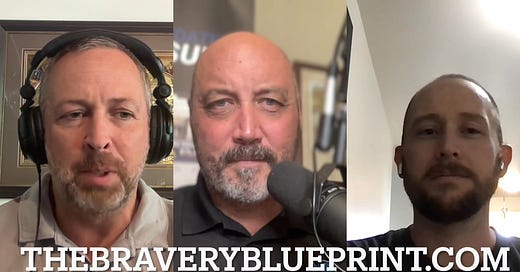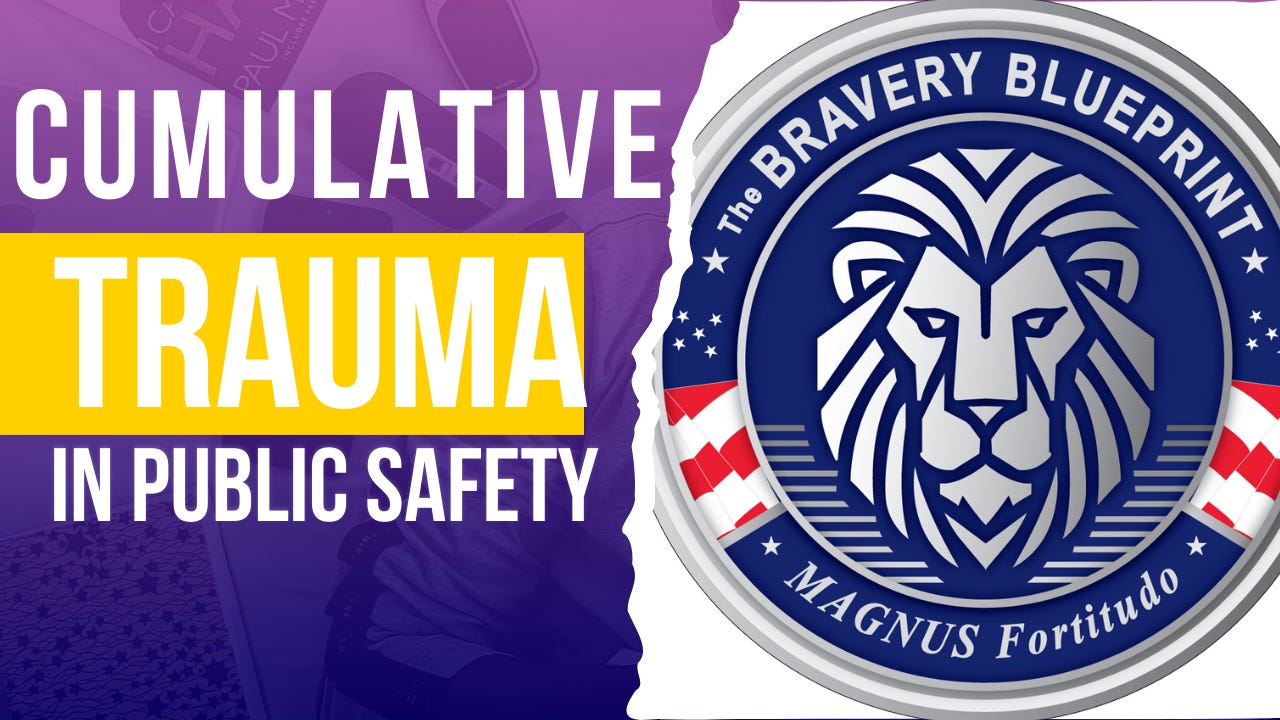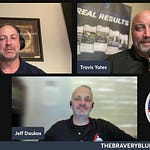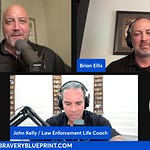Welcome to the Bravery Blueprint, where we dive deep into essential conversations surrounding leadership, well-being, and performance in the realm of public safety. In this episode, co-host Travis Yates and I are joined by James Gilman, a veteran with an extraordinary story that resonates with the public safety sector.
Through James' military experiences, we tackle the often unspoken impact of cumulative trauma faced by professionals in public safety.
Understanding Cumulative Trauma
Public safety workers, like their military counterparts, constantly confront individuals during their worst moments. This can lead to cumulative trauma over the course of a career.
The Nature of Public Safety
Public safety professionals operate much like those in the military, deployed to face stressful situations daily. Unlike the military, which deploys for set periods, public safety personnel often face continuous exposure.
"It's much like being deployed. The only difference is in public safety are deployed for an entire career."
The Impact of Cumulative Trauma
The demands of public safety are not just physically exhausting but emotionally taxing as well. Many of the professionals have type A personalities, often leading them to believe they can handle everything alone, until they can't.
Recognizing the Symptoms
Emotional Shutdown: A common response is to shut down emotionally, avoiding speaking about these experiences.
Substance Use: Some may cope by turning to alcohol or other substances.
Ignoring Wellness: In a fast-paced world, adding a chaotic job can be a recipe for trouble.
James Gilman’s Journey
James Gilman, a seasoned veteran, shares his wellness journey and insights on dealing with cumulative trauma and explores intentional living. Joining the military right out of high school, James faced high-pressure environments during two deployments to Iraq. Upon returning, integrating back into civilian life proved challenging. His experience underscores the need for better support systems for veterans transitioning to civilian life.
Transition to Civilian Life
After leaving the military, James worked with the State Department and the CIA, serving for a total of 18 years in high-risk zones like Afghanistan. However, it was only in 2016 that he began understanding the importance of mental wellness and personal reflection.
Challenges of Transition
The abrupt change from high-pressure environments to civilian life can lead to a lack of purpose and connection. Veterans like James often find themselves longing for the structure and camaraderie of military life.
Bridging the Gap in Training
The military excels at preparing soldiers for combat but falls short in addressing the mental wellness needed post-deployment. The focus is heavily on mission readiness, leaving little room for personal well-being.
Training Focus Areas
Threat Perception: Soldiers are trained to continuously perceive threats and react quickly.
Mission First: The mission takes precedence over individual needs.
Lack of Emotional Training: Emotional responses are often neglected in training.
Addressing Misconceptions
The narrative around veterans and PTSD often focuses on what's "wrong" rather than understanding "what happened." This perspective shift is crucial for fostering better support systems.
"There's nothing wrong with us, it's not what's wrong with us, it's what happened to us."
Building a Support Network
Having a band of brothers or a support network is vital for maintaining mental toughness and resilience. James emphasizes the importance of surrounding oneself with trustworthy individuals who understand and support you.
Embracing Vulnerability
While vulnerability is often perceived as weakness, it is actually essential for growth. Opening up, asking questions, and seeking help when needed build strength.
Daily Practices for Growth
James shares his daily routine to promote mental wellness and growth:
Morning Routine: Start the day with intentional reading and reflection.
Exercise: Engage in a fun physical activity to break a sweat.
Journaling and Gratitude: Reflect on the day and express gratitude.
Resources and Recommendations
James volunteers with the Boulder Crest Foundation, which teaches post-traumatic growth practices tailored for veterans and public safety professionals. This organization offers valuable resources for those looking to transition or seeking growth.
Explore the Warrior Path program at Boulder Crest Foundation and consider integrating similar frameworks into public safety training.
Conclusion
Cumulative trauma in public safety is a reality that needs attention. By sharing stories like James Gilman's, we hope to inspire courage and action. This journey of understanding and addressing cumulative trauma is ongoing, offering pathways for growth, resilience, and better leadership within our communities.
For further resources, show notes, and additional content, please visit our site.
Stay courageous, stay committed, and keep growing.
Travis Yates is the co-author of “The Courageous Police Leader” and has been training risk management and leadership for over two decades that have spanned thousands of students and 48 states. After dedicating over 30 years to the law enforcement profession, he is now working full-time consulting and training law enforcement leaders across the country.
Brian Ellis is a retired law enforcement lieutenant with over 25 years of service. He is the co-author of “The Theory of Magnus Ovea”, and his dedication to the theory of leadership led him to the National Command & Staff College, where he and his colleagues launched MAGNUSWorx, an education and data analytics platform dedicated to peak performance and wellbeing. Brian is a speaker, coach, and trainer for government and private organizations, dedicated to promoting leadership, high-performing teams, and providing others with actionable information for personal preparedness and resilience. His work has been featured in various media outlets, including numerous articles, book chapters, and podcasts.














Share this post